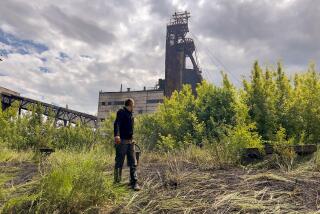The Dependency Syndrome
- Share via
As coal strikes continue sporadically in many coal-mining regions of the Soviet Union, alarm is growing in Moscow. In an unscheduled speech to the new Soviet Parliament Wednesday, Soviet President Mikhail S. Gorbachev warned that continued work stoppages could have “very far-reaching economic, social and political consequences.” He is well aware that the outcome of this crisis may predict the outcome of perestroika .
The strikes are occurring in an industrial sector with enormous economic and ideological significance. Should the government fail to control the situation, not only will the country’s coal revenues suffer but the Communist Party’s legitimacy as the guiding light of the proletariat will be injured. The Ukraine, locale of the Donetski coal basin, is a politically sensitive region of the Soviet Union where Moscow can tolerate little social unrest. Moreover, the miners’ demands reflect universal Soviet concerns, especially the desire for a higher standard of living. How the government handles the strikers’ demands will reveal much about its ability to answer similar concerns throughout Soviet society. The whole country is watching, and the Kremlin feels the steady gaze.
To bring the situation to a successful resolution, Gorbachev has to address the strikers’ two major demands: better living and working conditions and greater local control over their enterprises. The government has already flown emergency supplies of sugar, meat and soap to strikers in Siberia, but they correctly view such gestures as stop-gap measures. Gorbachev cannot solve the situation with mere promises, in part because strikers are aware that he probably cannot keep them.
While the strikers are talking about economic freedom, their specific demands show that they still look to the government to make basic decisions about their lives and take care of their essential needs. “We were told for years: ‘Put out more coal and don’t worry about anything. We’ll feed you and dress you,’ ” Nikolai Yatsenko, a Siberian miner, complained to a Soviet newspaper. “We worked our heads off, put out coal, and now we hear: ‘Not only do you have to put out coal, you have to take care of yourself in everything else, too.’ ” This attitude of dependency on the state is the largest obstacle to the success of perestroika. But it also may be the key to resolving the strikes.
Some of the strikers’ demands--calls for less government bureaucracy and greater local economic autonomy--echo strains of Gorbachev’s reform program. What Gorbachev has to do is persuade strikers that improvements in living conditions are best achieved through decentralizing economic reform. If he makes his case convincingly, he may be able to turn the strikes into a referendum in support of his program of economic restructuring.
But to do that, Gorbachev first has to change workers’ expectations of the state’s role in their lives. Strikers may have demanded higher wages, more consumer goods and greater control over economic decision-making, but the main thing on the bargaining table is the Soviet social contract. Gorbachev faces a tough negotiating session.
More to Read
Sign up for Essential California
The most important California stories and recommendations in your inbox every morning.
You may occasionally receive promotional content from the Los Angeles Times.













